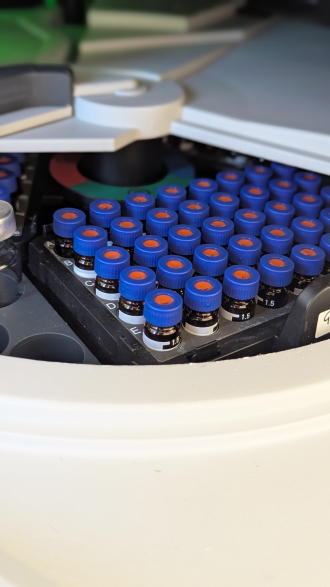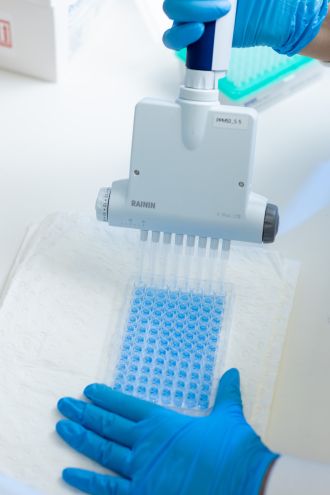Media release
From:
PROTEOMICS INTERNATIONAL LAUNCHES WORLD-FIRST BLOOD TEST TO RULE OUT OESOPHAGEAL CANCER AT 21ST ISDE WORLD CONGRESS FOR ESOPHAGEAL DISEASES
BRISBANE, AUSTRALIA – 17 September 2025 – Attendees at the World Congress for Esophageal Diseases, held in Brisbane from 18 to 20 September, will be the first in the world to experience Promarker®Eso (www.promarkereso.com), a revolutionary diagnostic test designed and developed in Australia.
PromarkerEso is a world first protein biomarker-based blood diagnostic for the rule out of Oesophageal adenocarcinoma (EAC). Oesophageal cancer (EAC) is one of the deadliest forms of cancer, with Barrett’s Oesophagus - a precursor affecting up to 2% of adults - often going undiagnosed. PromarkerEso addresses this critical gap by enabling earlier detection in a primary care setting, improving access to prompt diagnosis and treatment, and identifying risks that may be presently missed.
The test is designed to make life easier and to reduce anxiety for those people living with chronic reflux. In Australia, more than 560,000 people live with chronic reflux, a condition known as Gastric esophageal Reflux Disease (GERD). The Royal Australian College of General Practitioners (RACGP) reports that 11.5% of all GP visits are related to reflux. Individuals living with GORD are commonly referred to a gastroenterology specialist for an invasive endoscopy procedure involving anaesthesia. This procedure, often repeated at annual/bi-annual intervals, requires a fasting prep the night before, a day off work, and an assisted transport home from the hospital or clinic. In contrast, PromarkerEso uses a standard and quick visit to a local blood collection center.
With the release of PromarkerEso across Australia, people living with GERD may now have a quick, non-invasive alternative to endoscopy. Clinical validation of the test demonstrates a Negative Predictive Value (NPV) of 99.99% based on the estimated prevalence of EAC, supporting physician’s ability to rule out EAC and to confidently manage their patient’s GERD. The high accuracy of the PromarkerEso test (91.4% sensitivity, 98.9% specificity and area under the curve of 0.98 (95%CI 0.96-1.00)1 gives clinicians critical knowledge to conduct follow-up investigations under endoscopy to better identify the presence of EAC, a cancer that is often detected too late and carries poor survival outcomes.2
Recently, routine endoscopic surveillance to assess a patient’s risk of EAC in the presence of Barrett’s oesophagus (a well-known precancerous condition of EAC) has been called into question with publication of the BOSS Trial results earlier this year. As published in the Journal of Gastroenterology,3 the BOSS Trial authors reported no difference in outcomes between bi-annual surveillance endoscopy and endoscopy at-need only. Thus, a recognised need for a better diagnostic tool for EAC in the presence of Barrett’s oesophagus opens a significant opportunity for PromarkerEso.
Proteomics International’s Managing Director Dr Richard Lipscombe states:
"The national launch of PromarkerEso offers hope to thousands of Australians living with chronic reflux and are at risk of oesophageal cancer. This blood test reduces reliance on costly multidisciplinary and invasive procedures, offers better accuracy, and improves patient experience."
BOSS Study author, Professor Hugh Barr, MD, FRCS, ChM, will attend the ISDE World Congress to present this data in a session entitled, “Challenges in the Diagnosis and Management of GERD”. This session will include a presentation on PromarkerEso.
Also at the ISDE World Congress, Proteomics scientist Miss J. Sheahan will present clinical results validating the test for all stages of EAC (ASX Announcement, 8 Sept 2025).
The launch marks a major milestone in precision medicine. Original research into the protein biomarkers for the test was conducted at QIMR Berghofer Medical Research Institute. The PromarkerEso test was then designed and developed by Proteomics International. Release of this test positions Australia, and Proteomics International (ASX: PIQ), at the forefront of global cancer diagnostics innovation and commercialisation.
The test is now available across Australia to patients through a telehealth consultation via www.myTEST.health, and by physician referral. Blood collection is facilitated by the Healius Pathology network of over 2,100 collection centers across Australia.
About Proteomics International
Proteomics International (Perth, Western Australia) is a wholly owned subsidiary and trading name of PILL (ASX: PIQ), a medical technology company at the forefront of precision diagnostics and bio-analytical services. The Company specialises in proteomics – the industrial scale study of the structure and function of proteins. Proteomics International's mission is to improve the quality of lives by the creation and application of innovative tools that enable the improved treatment of disease.
About QIMR Berghofer Medical Research Institute
QIMR Berghofer Medical Research Institute is one of Australia’s largest and most successful medical research centres, dedicated to improving health through impactful discoveries and translational science. Our world-class researchers focus on cancer, infectious diseases, mental health and chronic disorders, working closely with clinicians and partners to develop new diagnostics, better treatments and prevention strategies. Established in 1945, the Institute is based in Brisbane and is home to over 1,000 scientists, students and staff, all committed to turning breakthrough ideas into real benefits for patients and communities.
References
¹ Sheahan J, Wang I, Galettis P, Watson DI, Joshi V, Hill MM, Lipscombe R, Peters K, Bringans S. A Clinical Validation of a Diagnostic Test for Esophageal Adenocarcinoma Based on a Novel Serum Glycoprotein Biomarker Panel: PromarkerEso. Proteomes. 2025 Jun 4;13(2):23. doi: 10.3390/proteomes13020023. PMID: 40559996; PMCID: PMC12196998.
2 Hur C, Miller M, Kong CY, Dowling EC, Nattinger KJ, Dunn M, Feuer EJ. Trends in esophageal adenocarcinoma incidence and mortality. Cancer. 2013 Mar 15;119(6):1149-58. doi: 10.1002/cncr.27834. Epub 2012 Dec 11. PMID: 23303625; PMCID: PMC3744155.
3 Old O, Jankowski J, Attwood S, Stokes C, Kendall C, Rasdell C, Zimmermann A, Massa MS, Love S, Sanders S, Deidda M, Briggs A, Hapeshi J, Foy C, Moayyedi P, Barr H; BOSS Trial Team. Barrett's Oesophagus Surveillance Versus Endoscopy at Need Study (BOSS): A Randomized Controlled Trial. Gastroenterology. 2025 Apr 1:S0016-5085(25)00587-6. doi: 10.1053/j.gastro.2025.03.021. Epub ahead of print. PMID: 40180292.
Multimedia





 Australia; QLD
Australia; QLD



